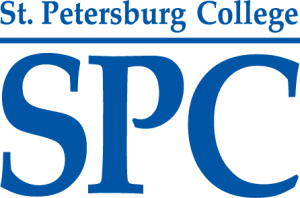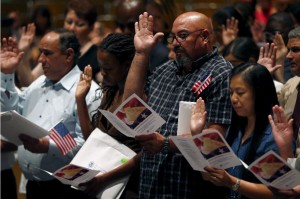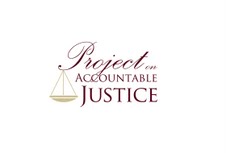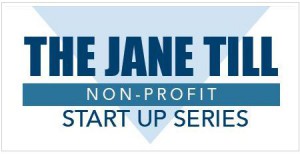 To view St. Petersburg College’s full report, please click HERE.
To view St. Petersburg College’s full report, please click HERE.
Citizenship Ambassador Initiative
 St. Petersburg College partnered with the United States Citizenship and Immigration Services (USCIS) to develop a workshop model for engaging students to help immigrant members of the community prepare for the United States Civics Exam in order to become U.S. citizens. The project is centered at SPC’s campus in Clearwater, which has a large and diverse population of immigrants. Student volunteers receive training to become Student Ambassadors, which includes lessons in leadership, cultural sensitivity, and the naturalization process. Professors prepare and deliver multi-media lessons in history and government to prepare candidates for the citizenship exam, and the Student Ambassadors lead one-to-one tutoring, working with the guests using USCIS worksheets. Through these lessons, applicants are exposed to all 100 possible questions on the USCIS Civics Exam.
St. Petersburg College partnered with the United States Citizenship and Immigration Services (USCIS) to develop a workshop model for engaging students to help immigrant members of the community prepare for the United States Civics Exam in order to become U.S. citizens. The project is centered at SPC’s campus in Clearwater, which has a large and diverse population of immigrants. Student volunteers receive training to become Student Ambassadors, which includes lessons in leadership, cultural sensitivity, and the naturalization process. Professors prepare and deliver multi-media lessons in history and government to prepare candidates for the citizenship exam, and the Student Ambassadors lead one-to-one tutoring, working with the guests using USCIS worksheets. Through these lessons, applicants are exposed to all 100 possible questions on the USCIS Civics Exam.
In its inaugural year in 2014, the initiative brought together participants from 28 countries to be involved in the citizenship exam workshops. As part of the initiative, SPC hosted a USCIS Naturalization ceremony during Constitution week with 100 people from 25 countries involved. As a Federal Judge administered the oath of allegiance to 100 new citizens, there were tears in the eyes of many in the audience. Instructors who volunteered their time to lead the workshops on weekends described the ceremony as one of the most moving experiences of their careers. Students likewise felt the emotion of the swearing-in ceremony. Said one, Vlora Bekteshi Neziri, “I’m so honored to do this, because it’s important to inspire people and give them hope.” After the ceremony, she added, “Not only are they celebrating but we are celebrating with them. It shows that the college is there for the community.”
Besides the satisfaction of having served others, the students gained a solid understanding of their country’s history and government, honed interpersonal relationship and speaking skills, raised awareness of and appreciation for cultural differences, and, perhaps most importantly, heightened appreciation of the value of their own privileges as American citizens.
Tags: Citizenship Ambassador Initiative, Best Practices, U.S. Citizenship and Immigration Service, U.S. Civics Exam, Naturalization Ceremony, SPC, Civics Initiative
- View Report: SPC Best Practices for Civic Engagement
- Read More: St. Petersburg Tribune Article
- Read More: SPC News article
For more information, contact:
Joseph Smiley, Ed.D
Dean, Social & Behavioral Sciences
St. Petersburg College
smiley.joseph@spcollege.edu
727-712-5783
Civic Engagement Homeless Internship Project
St. Petersburg College psychology majors are serving the homeless population while gaining valuable hands-on experience through a psychology internship program established in collaboration with the Public Defender’s Office of the Sixth Judicial Circuit Court. Up to 17 students are selected each semester (fall, spring and summer) to intern at Pinellas Safe Harbor, a shelter operated by the Pinellas County Sheriff’s Office and supported by Pinellas County Government and the City of St. Petersburg. It provides an alternative to incarceration for up to 450 residents.
Students undergo a fairly rigorous screening process before being accepted as interns in the program. First step comes in the middle of the prior semester, with queries to instructors to identify qualified and interested students to apply. A faculty/administration team then reviews applicants’ academic records for course completion, GPA, and faculty recommendations to choose candidates for the next level of screening.
That is an interview with the student’s professor and a representative from Pinellas Safe Harbor to ensure the applicant has the knowledge, critical thinking ability and temperament to serve clients with a diverse range of social and mental challenges. Upon selection, student interns complete a four-hour training in Millieu Therapy and an eight-hour training in how to work with homeless populations.
Upon completion of the training, interns are scheduled for two- to three-week shadowing sessions with Safe Harbor mentors, case managers and security personnel. After satisfactorily completing the shadowing training, interns are assigned to work in teams to conduct listening groups and to create special projects that meet residents’ needs or provide appropriate activities for them.
The psychology interns help residents transition within Safe Harbor, listen to their concerns, cultivate a therapeutic environment, and bridge them to needed resources that ultimately may resolve the issues that lead to perpetual homelessness. This is civic engagement at its most productive and rewarding outcome.
Tags: Homeless, Internship, Pinellas Safe Harbor, Psychology, Best Practices, SPC, Civics Education, Civics Initiative
- View Report: SPC Best Practices for Civic Engagement
- Read more: SPC Internship Blog
For more information, contact:
Joseph Smiley, Ed.D
Dean, Social & Behavioral Sciences
St. Petersburg College
smiley.joseph@spcollege.edu
727-712-5783
Public School Mentoring Project
Melrose Elementary School in St. Petersburg is one of the lowest-performing elementary schools in the state, with a large portion of third-graders retained to repeat the grade. St. Petersburg College collaborated with the Pinellas School District to provide student mentors to work with the struggling students on a weekly basis, providing academic and interpersonal support to help them achieve success in school.
SPC student mentors are recruited and selected from Psychology and American National Government classes. They agree to complete a Pinellas County Schools training program and commit to one semester of weekly 40-minute, one-on-one meetings with a third-grade mentee at a pre-determined time, generally during the lunch hour.
Each week after a visit the mentors check in with school staff to discuss their mentee’s progress and challenges and any strategies that may benefit the child. They also attend weekly club meetings with fellow SPC students to share their experience in interacting with the third-graders. At the end of the semester they are required to write a paper detailing their experience.
While a full outcome on the project will not be available until the end of the 2014-15 academic year, Melrose Elementary officials report progress during the fall semester in the socialization and academic progress of the mentored students. For the SPC mentors themselves, the experience prompts them to apply themselves to their coursework, and adds a robustness to class discussions about the importance of civic virtue. Additionally, they are learning real-life application of the content covered in their coursework.
Tags: Pinellas School District, Melrose Elementary School, Mentors, Best Practices, SPC, Civics Education, Civics Initiative
- View Report: SPC Best Practices for Civic Engagement
For more information:
Joseph Smiley, Ed.D
Dean, Social & Behavioral Sciences
St. Petersburg College
smiley.joseph@spcollege.edu
727-712-5783
Project on Accountable Justice
 The Project on Accountable Justice was launched in 2012 as an independent, non-partisan organization with a mission to provide meaningful, public-interest research and education that will help advance public safety using evidence- and research-informed approaches to criminal and juvenile justice in Florida. The project is an example of how collaboration can exponentially expand the work product – and success – of a civics initiative. St. Petersburg College partnered with three other institutions of higher education to employ data-driven research with the goal of bringing accountability and transparency to the criminal justice system in Florida, a system badly in need of reform. Other members of the partnership are Florida State University, Baylor University, and Tallahassee Community College.
The Project on Accountable Justice was launched in 2012 as an independent, non-partisan organization with a mission to provide meaningful, public-interest research and education that will help advance public safety using evidence- and research-informed approaches to criminal and juvenile justice in Florida. The project is an example of how collaboration can exponentially expand the work product – and success – of a civics initiative. St. Petersburg College partnered with three other institutions of higher education to employ data-driven research with the goal of bringing accountability and transparency to the criminal justice system in Florida, a system badly in need of reform. Other members of the partnership are Florida State University, Baylor University, and Tallahassee Community College.
The project combined academic data-gathering research, summarizing best practices implemented in other states, and staging a series of public forums at which panels of criminal justice specialists debated what works and what doesn’t in creating an effective criminal justice system. There is a growing feeling among policy-makers, especially conservatives, that the American criminal justice system badly needs to institute reforms that produce public accountability and measurable results, much as public education has been forced to do in the last decade. At least a dozen states have taken steps to reduce the size and cost of their corrections systems over the last several years through a formal review process known as “Justice Reinvestment.”
Project Chairman Allison DeFoor explained the criteria for the study in this way: “Florida’s movement to justice reforms MUST be grounded in the integrity of data, with rigorous external oversight. And, as such, the research must be built under the neutrality of a consensus building structure–the Switzerland of Justice Reform. The venture moving forward MUST be transparent. It MUST be free of entangling relationships, particularly when they involve money and profiteering on the backs of Floridians as taxpayers and society more generally.”
DeFoor and project Director Deborah Brodsky coordinated the research, assembling and organizing the data, seeking out best practices, and lining up subject-matter experts to serve on panels at the forums. Prof. Jeffery Kronschnabl of SPC’s Public Policy and Administration Baccalaureate program serves on the PAJ Executive Board. The Institute for Strategic Policy Solutions at SPC provided funding and planned and staged three forums spread over seven months in 2013, two at SPC’s Seminole campus and the third at the FSU College of Law. Background research was provided by Baylor and the Florida Institute of Government and the James Madison Institute at FSU.
DeFoor and Brodsky produced a white paper that recommended five strategies to reform Florida’s correctional system. Released on Nov. 13, 2014, the report received widespread news media coverage.
Tags: Prison Reform, Criminal Justice, Department of Corrections, Project on Accountable Justice, Best Practices, SPC, Civics Education, Civics Initiative, Institute for Strategic Policy Solutions
- View Report: SPC Best Practices for Civic Engagement
- View PAJ Report: Recommendations to Improve DOC 11-7-14
- View Resources: Project on Accontable Justice Forums
For more information:
Prof. Jeffery Kronschnabl
Instructor in Charge
Baccalaureate Programs and University Partnerships
St. Petersburg College
727-394-6205
Kronschnabl.jeffery@spcollege.edu
The Jane Till Non-Profit Start-up Series
Volunteering for a non-profit organization is an excellent way to make students aware of the importance of civic engagement. But St. Petersburg College is going beyond merely working for a non-profit. It is encouraging students to create their own 501(3)c charity organization.
The project, called The Jane Till Non-Profit Start-Up Series, is named for a much-beloved Ethics Professor at SPC who passed away in 2013. Its goal is to teach students the value of community service by actually creating their own charitable organization to fill a need that they themselves identify. Planned to launch in Spring 2015, it is a competitive project at four major SPC campuses: (St. Petersburg Gibbs, Clearwater, Seminole, and Tarpon Springs). The goal is to recruit at least 70 students for the inaugural competition.
Participating students will take part in an eight-week training program focused on developing, launching, and maintaining their community service project. Two-hour workshops led by experienced faculty will be held weekly at each of the four campuses. The campus-level winners will advance to a college-wide final and have an opportunity to compete for $5,000 in seed money to launch their charity.
The 2015 Series kicks off in late January; the instructional sessions begin in February and run through late March 2015. Individual campus competitions will be held in mid-April, and the college-wide final round at the end of that month. SPC Applied Ethics Faculty will work with students on laying the foundation for launching a non-profit organization, covering such topics as mission and vision statements, business plans, supervising volunteers, ethics in community service, setting up a board of directors, and so on. The instructional sessions include both instructional time and working sessions for participants to craft their vision.
The competitive portion of the program will be judged by community partners active in the non-profit arena, so students will receive feedback from experienced, sagacious experts.
The Applied Ethics Institute anticipates that this will be a recurring annual program held each spring semester.
- View Report: SPC Best Practices for Civic Engagement
- View Webpage: Jane Till Non-Profit Start Up Series Webpage
- Events: Jane Till Non-Profit Start Up Series Info Session
Tags: Non-profit, Start-up Series, Civics Education, SPC, Best Practices, Civics Initiative, Jane Till
For more information:
Susan Demers, Ph.D
Dean, College of Policy, Ethics and Legal Studies
St. Petersburg College
Phone: (727)791-2501
demers.susan@spcollege.edu
Pinellas County High School Ethics Bowl
The Pinellas County High School Ethics Bowl is a division of the National High School Ethics Bowl. Teams from participating schools compete against one another in forming arguments about contemporary ethical issues. The Ethics Bowl is not a “debate,” as such, but the students spend hours researching case studies and working to prepare their best ethical arguments for presentation and critical examination, and, in turn, use critical thinking skills to examine the arguments of others. Though competitive, the aim of the Pinellas County High School Ethics Bowl is to help young minds develop critical thought and focus that thought on timely issues.
2013 Pinellas County Ethics Bowl Champions- St. Petersburg High School
The Pinellas County High School Ethics Bowl is held each February at the Seminole Campus of St. Petersburg College. As many as 11 Pinellas County high schools have sent teams of three to five students, and some schools field more than one team. This offers them the opportunity to interact socially and engage in ethical discussions with students from the entire demographic spectrum of Pinellas County. The bowl is sponsored by the school district and by the SPC Applied Ethics Institute. The former supports the recruitment of coaches and funding for teams, while SPC provides the necessities for the competition (case studies, facilities and catering, and recruitment and training of officials). The winner from the Pinellas Bowl advances to the National High School Ethics Bowl, and, in fact, the inaugural national champion was St. Petersburg High School!
The Pinellas County bowl is a continual success that provides hundreds of students with opportunities to become more informed, thoughtful, citizens.
Tags: Ethics Bowl, High School, Pinellas County, SPC, Civics Initiative, Best Practices
- View Report: SPC Best Practices for Civic Engagement
- Read More: SPC News Article
- Read More: Tampa Bay Times Article
- Events: 2015 Pinellas County High School Ethics Bowl
For more information:
Susan Demers, Ph.D
Dean, College of Policy, Ethics and Legal Studies
St. Petersburg College
Phone: (727)791-2501;
demers.susan@spcollege.edu
Public Policy & Administration Baccalaureate Program
Future leaders ready to step into public service careers are being developed in one of St. Petersburg College’s newest and most successful baccalaureate programs, the Public Policy & Administration degree. PPA has grown exponentially in three years, from an initial enrollment of 12 students to having served over 250 students.
The program is built on a commitment to community service and civic engagement through using the best theoretical and practical applications. Course requirements send students out into the community to engage with public agencies on real-world issues. For example, in the State and Local Government and Public Policy course (PUP 3040), students are required to attend a local government meeting and select an agenda item of public interest. Students must then conduct a face-to-face interview with an expert in the discipline/area under review and perform a comprehensive policy analysis.
In the Policy Leadership course (PUP 3033), students must meet the requirements above but in addition they must present their findings to the government body about to make a policy decision on the agenda item under consideration. Case studies and class exercises are employed to help students develop skills in multi-party negotiations, conflict resolution, crisis and resource allocation and decision making.
For the Fall and Spring semester, the PPA faculty hosts a Public Policy Leadership Speaker Series Luncheon to give students an opportunity to meet and interact with government and professional leaders. Besides hearing first-hand how decision-making and leadership works in the real world, students are expected to engage in question-and-answer sessions with the speakers to demonstrate their public speaking, critical-thinking skills, and personal perspectives.
PPA students also have closely followed the implementation of the Project on Accountable Justice, a real-world study aimed at reforming Florida’s criminal justice system. (See Best Practice report elsewhere on this page). From inception of the executive committee up to the release of findings and recommendations in Fall 2014, this has been a real-world, real-time lesson in development of public policy.
Tags: Public Policy & Administration, Public Service Career, Leadership Speaker Series, Project on Accountable Justice, Best Practices, SPC, Civics Initiaitive
- View Report: SPC Best Practices for Civic Engagement
For more information:
Jeffery Kronschnabl
Instructor in Charge
Public Policy & Administration Baccalaureate Degree Program
St. Petersburg College
Kronschnabl.jeffery@spcollege.edu
727-394-6205




